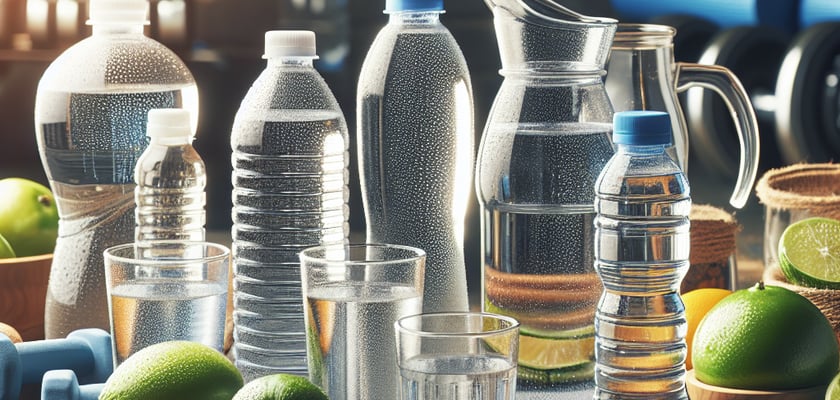Picture this: water, Earth’s signature cocktail, zero calories, the original thirst-quencher, and your surprise ally in the epic battle of the bulge. Yes, folks, the liquid life-elixir that sustains us is also a clandestine weight-loss agent. Who knew? Well, your body did—it’s been trying to RSVP yes to the water-weight-loss party for ages, and it’s about time we all got on board. But how much aqua should you actually guzzle to tip the scales in your favor? It turns out that there is no one-size-fits-all answer, as your own personal watering needs are as unique as your fingerprint or the way you can sing every line of your favorite 90s sitcom theme song in the shower.
Now, hold onto your reusable water bottles as we embark on a journey through the rivers and streams of hydration for weight loss. We’ll explore the riveting effects of H2O on your metabolism, how it can act like a personal interior designer redecorating your appetite, and the splashy role it plays in flushing out the old to bring in the new you. So, ready your glass and prepare your ice cubes—because in the next section, we’re diving deep into the key takeaways that will help you navigate the tides of this hydration sensation. Sip back, relax, and let the current of knowledge guide you to a healthier, lighter version of your water-loving self. Keep your floaties at hand; the fun’s just about to start!
Key points I covered in this post
1. Drinking water can boost metabolism and increase the number of calories burned, leading to weight loss. Consuming 0.5 liters (17 ounces) of water was shown to increase metabolism by 10-30% for about an hour. This effect can contribute to the overall calorie deficit required for weight loss.
2. Water can help with weight loss by reducing appetite and food intake at meals, particularly if consumed before eating. One study demonstrated that drinking water half an hour before meals led to a significant reduction in the number of calories consumed, resulting in weight loss over a 12-week period.
3. Substituting calorie-laden drinks with water can significantly reduce overall calorie intake. Since beverages like soda and juice are high in calories and sugar, water serves as an excellent replacement that lacks these weight-gain inducing components.
4. It’s recommended to drink water consistently throughout the day to support weight loss efforts, with suggestions varying from 1-2 liters (about 34-68 ounces) daily. However, individual water needs can differ based on factors such as body weight, activity level, climate, and diet.
5. To maximize the impact of water on weight loss, it’s advised to drink cold water, as the body uses additional energy to heat the water to body temperature. This process, known as water-induced thermogenesis, can contribute to an increased metabolic rate and energy expenditure.
**The optimal amount of water one should consume for weight loss can vary based on individual factors; however, a general guideline is to drink at least 8-10 eight-ounce glasses (approximately 2 to 2.5 liters) of water per day.** Increasing water intake can help with weight loss by boosting metabolism, suppressing appetite, and helping the body to burn fat more efficiently.
The Role of Hydration in Metabolism
Drinking sufficient water is crucial for maintaining an optimal metabolic rate. Metabolism refers to the process by which the body converts the calories consumed into energy. Staying well-hydrated enables the body to perform these metabolic functions effectively. A study has shown that drinking 500 ml of water can temporarily boost metabolism by 24% for up to an hour after consumption. This process, known as water-induced thermogenesis, can contribute to weight loss efforts when combined with a healthy diet and exercise.
Water as an Appetite Suppressant
Consuming water before meals can act as a natural appetite suppressant. It fills the stomach, leading to a feeling of fullness which can result in eating fewer calories during meals. One study found that people who drank water before a meal lost 44% more weight over a 12-week period than those who did not. This approach is simple and can be easily incorporated into a daily routine to support weight loss goals.
Hydration and Fat Oxidation
Fat oxidation is the process by which the body breaks down fat cells to create energy. Adequate hydration is necessary for this process to occur effectively. When dehydrated, the body is less efficient at breaking down fats for energy, which can hinder weight loss. Ensuring consistent water intake can support enhanced fat oxidation and contribute to a more effective weight loss journey.
Water Intake and Physical Activity
Engaging in regular physical activity is a key component of any weight loss strategy. Hydration plays a vital role in optimizing exercise performance. Becoming even mildly dehydrated can lead to reduced endurance, increased fatigue, and a decreased ability to regulate body temperature—all of which can negatively impact motivation and overall physical performance. By staying well-hydrated, individuals can ensure they are getting the most out of their workouts and facilitating weight loss.
Understanding Individual Hydration Needs
Individual hydration needs can vary greatly depending on body size, climate, exercise intensity, and dietary factors. One way to gauge hydration status is to monitor urine color, aiming for a light yellow to clear color, which indicates proper hydration. Additionally, one may require more water if living in a hot climate or engaging in high levels of physical activity. Other factors such as pregnancy, breastfeeding, and certain health conditions can also increase water requirements.
Can Drinking Too Much Water Be Harmful?
While adequate hydration is key for weight loss and overall health, it is possible to drink too much water, which can lead to a rare but serious condition known as water intoxication or hyponatremia. This occurs when the body’s sodium levels become dangerously low, potentially leading to confusion, seizures, and coma. It is important to balance water intake and not exceed the body’s needs.
Is There an Optimal Time to Drink Water for Weight Loss?
Timing water consumption may also have an impact on weight loss efforts. Drinking water before meals is a proven strategy, but staying hydrated throughout the day is equally important. Starting the day with a glass of water can kickstart metabolism, and sipping water regularly can prevent mistaking thirst for hunger, a common cause of overeating.
Guidelines for Water Consumption to Aid Weight Loss
1. Begin each day with a glass of water to jumpstart hydration and metabolism.
2. Drink a glass of water 30 minutes before eating to help control appetite.
3. Replace calorie-filled drinks with water to reduce overall calorie intake.
4. Carry a water bottle to encourage frequent sips throughout the day.
5. Consume water-rich foods like fruits and vegetables to boost hydration.
6. Listen to your body’s signals and drink when thirsty, aiming for clear or light yellow urine.
7. Increase water intake incrementally; do not drastically change consumption overnight.
8. Pay attention to your body’s responses to increased water intake and adjust accordingly.
Is There an Ideal Amount of Water I Should Drink Daily to Help With Weight Loss?
The exact amount of water you should drink daily to aid in weight loss can vary based on factors such as your body weight, activity level, and climate. However, a general rule of thumb is to drink at least eight 8-ounce glasses, which equals about 2 liters, or half a gallon per day. This is known as the 8×8 rule and is easy to remember. Some suggest drinking a glass of water before each meal to help reduce appetite and prevent overeating.
How Does Water Consumption Affect Metabolism?
Drinking water can boost metabolism by approximately 24-30% over a period of 1-1.5 hours, helping you burn off a few more calories. One study showed that drinking a half-liter (17 ounces) of water about 30 minutes before meals helped dieters eat fewer calories and lose 44% more weight than those who didn’t drink the water.
Can Drinking Water Help Suppress Appetite?
Some people may find that drinking water helps suppress appetite when consumed before meals. When your stomach senses that it’s full, it sends signals to the brain to stop eating. Water can help take up space in the stomach, leading to a feeling of fullness and reduced hunger. Moreover, sometimes our bodies can mistake thirst for hunger, so drinking water may help to prevent unnecessary snacking.
Does the Temperature of the Water Matter for Weight Loss?
While there has been some debate about whether cold water can help boost metabolism more than room-temperature water, the difference is likely minimal. What’s more important is staying hydrated, regardless of the temperature of the water. Choose a temperature that encourages you to drink more water throughout the day.
Are There Any Negative Effects of Drinking Too Much Water?
While staying hydrated is crucial, drinking too much water can lead to water intoxication or hyponatremia, which occurs when the balance of electrolytes in your body is disrupted due to excessive water consumption. It’s important to listen to your body and drink when you feel thirsty, aiming for the recommended guidelines but not exceeding 3-4 liters of water per day unless advised by a health professional based on your specific needs.
Final Thoughts
Understanding the role water plays in weight loss is essential for anyone looking to shed some pounds healthily. Drinking enough water can aid in appetite control, increase metabolism, and even enhance workout performance. While individual needs can vary, it’s clear that maintaining proper hydration is a key component of any weight loss plan, alongside a balanced diet and regular exercise. However, it’s equally important to avoid overhydrating, which can have adverse health effects. Finding the right balance for your body’s needs is the optimal strategy for using water to assist in healthy weight management.
As you embark on your weight loss journey, consider keeping a water bottle on hand to ensure you stay hydrated throughout the day. Remember that gradual, consistent changes in your hydration habits can yield long-term results. If in doubt about the right amount based on your unique situation, it’s always a good idea to consult with a healthcare provider or a nutritionist who can give you personalized advice. Embracing proper hydration as part of an overall healthy lifestyle can contribute significantly to achieving your weight loss goals.

